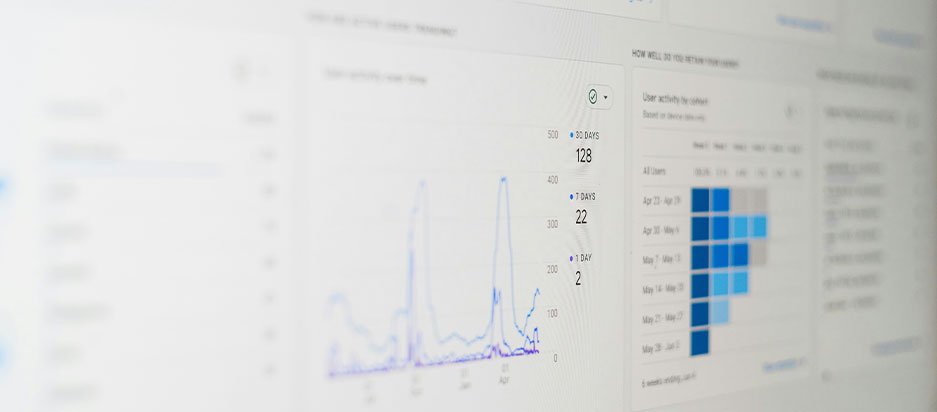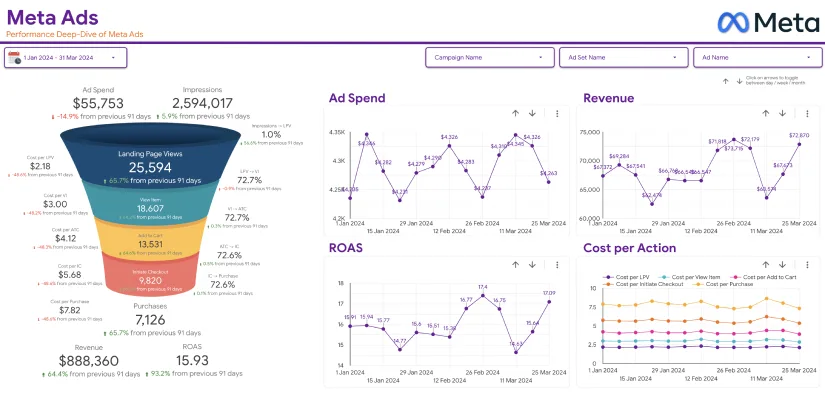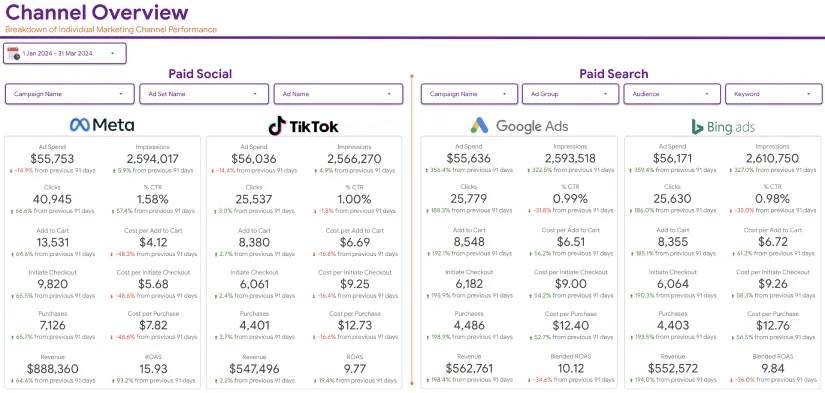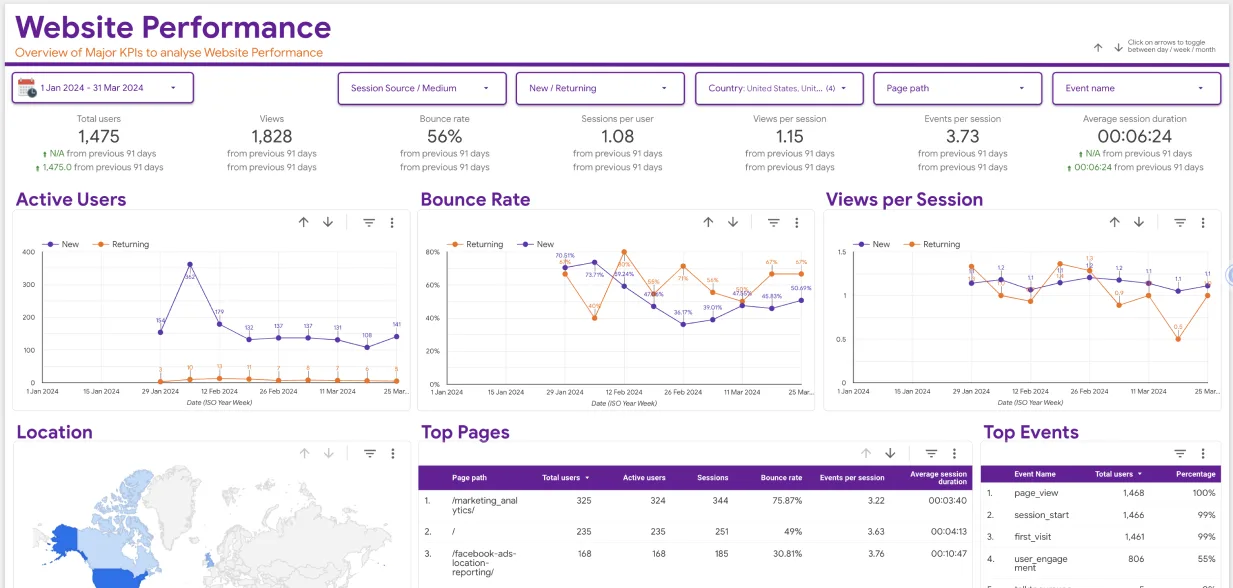Google Search Console vs Google Analytics: which tool is best suited for optimizing digital marketing strategies, whether you’re starting or already established? Both tools offer invaluable insights, but have different purposes and capabilities, and use distinct methods to collect data.
So, how successfully your search engine optimization (SEO) turns out will heavily depend on how well you align it with these two powerful tools from Google. In this detailed guide, we’ll take a look at their origin, primary features, how to integrate each into your strategy, and suitable use cases for each. Whether you’re a digital marketer, business owner, or SEO strategist, this Google Analytics vs Google Search Console comparison will help you understand which tool to maximize your efforts on.
Meet the Tools: GSC and GA in a Nutshell
Before we take a deep dive into the differences, let’s try to understand each tool at the basic level. If your goal is to measure traffic and everything about how people interact with your website, Google Analytics (GA) is the tool to go for. Think of it as a register of pages users visited, where they came from, and what they do while on your website. But it goes beyond just recording; it also gives you massive analytics and insights to help you know the performance of your SEO strategy.
On the other hand, Google Search Console (GSC) tells you how Google perceives your site and visitors’ interactions with it on the search engine results page (SERP). It gets its data from the powerful Google search index. In comparison, Google Analytics sources its data from tracking users’ activities using JavaScript code embedded in websites. If you’re using Google Analytics 4, it’ll track visitors to your website only if they accept cookie tracking.
| Feature | Google Search Console | Google Analytics |
| Tracking search engine data | ✓ | ☓ |
| Tracking user behavior | ☓ | ✓ |
| Monitoring site health | ✓ | ☓ |
| Keyword performance | ✓ | ✓ (Via Search Console integration) |
| Traffic source details | ☓ | ✓ |
Both tools have a major overlap in how they analyze traffic data, although GA offers more granular traffic details and tracking of conversions, especially if you’re looking for funnel metrics. So, how do you choose which tool for your digital marketing strategies? We say that integrating both into your campaign can help significantly improve your customer engagement and online preference.

In the following sections, we’ll take you through the Google Search Console vs Analytics features, differences, similarities, and plenty more insights to help you maximize your efforts and drive the numbers up.
What’s Google Search Console?
Think of Google Search Console (GSC) as your website’s personal fitness tracker. It helps you to troubleshoot and fix problems so your website can perform better on the SERP. With this tool, you get valuable insights into crawl coverage, search analytics, mobile responsiveness, security, and other site vitals.
Google launched GSC in 2006, but back then it was called Google Webmaster Tools, with the same intention of helping website owners understand website interactions with the Google search engine. Fast forward to about a decade later, in 2015, Google renamed the tool to what we know it today. During the rebranding, one of Google Search Console product managers, Michael Fink, described its audience as anyone who values Search. These include small business owners, digital marketers, designers, SEO experts, programmers, and webmasters.
Even after these enhancements, GSC still serves the same audience, and come January 2018, the kick-off version was replaced with a new, improved one. The old Google Search Console version was eventually phased out fully in September 2019, ushering in the new GSC that we use today.
What Can Google Search Console Do?
Here’s what GSC does:
Sitemap Submission
Have you ever wondered why the Google Search engine knows so much about your site? A sitemap is what Google search bots use to access details about the files and pages in your website domain.
Search Queries and Keywords
The tool lets you know which search phrases are bringing more visitors to your website. For instance, if you sell pet stuff and want to know how the keyword “best dog toys” is performing against other search terms, GSC spills the tea.
Crawl and Indexing Insights
Are all your web pages indexed? Is Google crawling it properly? GSC identifies indexing problems like blocked pages or broken links that could be preventing your website from ranking on search results.
Site Health Monitoring
This is where the analogy of GSC being your site’s fitness trainer applies well. The tool identifies mobile usability issues and security challenges to ensure your website is fit to rank on SERPs. If there’s sneaky malware hiding in your website, GSC will identify it and send you an alert quickly.
Crawl Rate Tracking

Crawl rate refers to the number of crawl requests made by Google search crawlers per second. This information is crucial as it helps you know the pages that are crawlable and which ones aren’t.
As soon as you add GSC to your website, Google starts keeping track of your website data, even before verifying that you’re the owner.
The Limitations of Google Search Console
As powerful as it is, GSC falls short in certain areas, so it’s good to know them and rationalize your expectations.
Delay window
There’s a window of up to three days when GSC collects, processes, and reports data about your website. So that means any information currently on your Google Search Console dashboard is about three days old.
Limited data retention period
GSC can only retain data for up to 16 months, so you can’t rely on it to run extensive historical analyses and reports.
Limited access to specific keyword queries
Google Search Console samples keyword information, which means you can’t access specific keyword phrases.
Limited Integration
Integrating GSC with third-party tools is not possible. This means you won’t be able to see social media or email marketing analytics with it.
What Is Google Analytics?

Google Analytics is a free platform for web analytics developed by Google and is useful to digital marketers and website owners in tracking and analyzing web traffic and user behavior. In a Google Search Console vs Google Analytics duel, if the former is your website trainer, the latter is your private investigator. GA watches the movements of visitors once they step onto your website.
Google Analytics was originally conceived out of two powerful software: Measure Map and Urchin on Demand. Google bought Urchin Software Corp, the parent company that owned Urchin on Demand, in 2005, then later on in 2006, acquired Adaptive Path, the owner of Measure Map.
Since August 2006, GA has been available for free use by the public, though Google released the tool to a small network. In 2011, the tech giant made changes to GA and released another version called Universal Analytics. By 2016, Google had released many more versions of the tool, including the Google Analytics 360.
The latest version, which has been around since 2020, is Google Analytics 4 (GA4).
What Can Google Analytics Do?
Here’s an overview of what GA does:
Audience Insights
GA lets you break down the details about your audience into smaller fragments, such as age, gender, and interests. You can identify patterns to help you tailor your campaigns to achieve maximum engagement.
Traffic Sources
Where are your audiences coming from? Whether it’s paid ads, organic searches, social media, or referrals, GA will let you know. With this insight, you can refine your marketing strategies to focus on the best-performing sources.
Real-Time Tracking
To refine your digital marketing efforts, you need to know your site activities in real time, such as the number of users, popular pages, and traffic spikes. With this, you can respond immediately to any issues or trends that GA highlights.
Behavior Flow Reports
With GA, you can visualize the movements of users throughout your website and spot obstacles in their journey so you can optimize their experiences.
Event Tracking

GA makes it easier to track specific user interactions like form submissions, button clicks, downloads, or video plays.
What Google Analytics Cannot Do
While doing a Google Search Console vs Google Analytics comparison, it’s easy to assume that GA is an all-powerful tool that can do almost anything. Before investing in it, it’s important to also know its limitations:
Tracking individual users
Every data that GA uses is anonymized, so it’s not possible to customize your marketing based on your site interactions.
Providing comprehensive, page-level feedback
GA won’t be able to tell you details such as the specific section of a webpage that users focus most on, the parts they scroll past, or the forms they fill before having a change of mind. For that, you’ll need to find a different tool.
Accurate data about returning visitors
Every time a person clears their website cookies or switches to different devices, they’re treated as a new user, though in reality, it’s the same person.
How GSC and GA Overlap
There is some overlap between the two tools, but it’s intentional. Both GA and GSC offer keyword data, however, the latter is more search-focused. GA, on the other hand, shows how those keywords generate actions on your website.
Integrating GA and GSC lets you view your search data directly within Google Analytics to access the best of both worlds.
Google Search Console vs Google Analytics: Which One To Pick
In deciding which tool between Google Search Console vs Google Analytics to go with, all that matters is your business or marketing objectives. For instance, if you’re aiming to strengthen the foundation of a new site, Google Search Console is instrumental because, at this stage, you want to rank better on SERP. However, if the traffic coming into your website is not converting, you need Google Analytics to gain insights into the behavior of visitors.
Even though individually, they serve up insightful data, GSC and GA are more powerful when used together. Google offers a way to integrate the two tools to tap into their capabilities and make your workflow simpler. This means you don’t have to switch between the tools and instead focus on one while sharing data between them.
Still, you can also amplify your GA game by building a more personalized dashboard to help you keep track of the metrics that matter the most to you. Eaglytics Co. builds a professional Google Analytics dashboard and can customize it to help you improve your campaign.
Final Verdict: GA and GSC Are Better Together
In the Google Search Console vs Google Analytics decision-making, each tool is great on its own, but together, they’re unstoppable. GSC’s main purpose is to help your website show up in SERPs while GA’s goal is to ensure you’re making the most of your traffic once it lands on your website.
So, whether you’re at the early stages of your digital marketing campaign or already established, integrate the two tools for seamless data analysis. Embrace the power of both tools with the help of professionals like Eaglytics Co. today and let your data tell a story that’s worth paying attention to.






